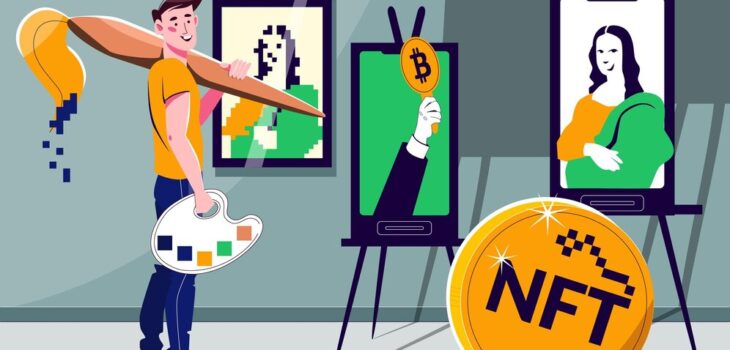 Business
Business
How Can NFT Game Development Services Transform Your Gaming…
The gaming industry is evolving at a remarkable pace, with NFT (Non-Fungible Token) technology playing a crucial role in this transformation. NFT game development services offer game developers new opportunities to create engaging, player-driven economies and add value to their gaming projects.
This blog highlights how these services can significantly improve your gaming project and provide it with a competitive edge in the market.
What Are NFT Games?
NFT games are games that integrate blockchain technology to create in-game assets represented as NFTs. These NFTs are unique, tradable, and verifiable digital items that players can buy, sell, or trade within the game. From digital assets like skins, weapons, or land to even characters, NFT games give players ownership of their in-game possessions.
Incorporating NFTs into your game can create a decentralized ecosystem where players have real stakes in the game world. NFT development services help you turn your game into an engaging platform for players to interact with blockchain technology.
How NFT Game Development Services Can Benefit Your Project
NFT game development services offer unique benefits that can significantly enhance your gaming project. One of the key advantages is the ability to provide players with real ownership of their in-game assets, adding both value and new possibilities for interaction. Let’s explore how these services can transform your game.
1. Add Ownership and Value to In-Game Assets
Traditional games often limit players’ control over their in-game items. Once acquired, assets cannot be transferred or sold, diminishing their perceived value. NFT game development services, on the other hand, offer players actual ownership of their digital assets.
Each item in the game, be it a rare sword, a unique skin, or even virtual land, can be represented as an NFT. This gives the item intrinsic value, as players can freely trade it on blockchain-powered marketplaces. Players benefit from this by monetizing their efforts, while developers can take advantage of transaction fees for every trade, creating a new revenue stream.
2. Foster Player-Driven Economies
Incorporating NFTs allows developers to create player-driven economies. Instead of relying solely on developers to dictate the game’s economy, players can now trade and exchange assets in real-time, creating a more dynamic environment.
By integrating NFT game development services into your project, you enable players to buy, sell, and use items in ways that reflect their preferences. The economy within the game becomes fluid and player-centric, improving long-term engagement and satisfaction.
3. Provide Transparency and Security
Blockchain technology, which supports NFTs, provides transparency and security that traditional gaming systems lack. Every transaction and trade made in an NFT game is recorded on the blockchain, making it publicly verifiable and immutable.
This ensures that the in-game assets, trades, and ownership histories are transparent and secure. Players are assured that the rarity and authenticity of the items they buy or trade are protected from manipulation or fraud. Blockchain’s security features also mitigate the risks of hacking, which is a concern in traditional gaming platforms.
4. Unlock New Revenue Streams
One of the most significant advantages of NFT game development services is the potential for additional revenue streams. In traditional games, developers typically rely on selling copies of the game, expansions, or in-game purchases to generate revenue. With NFT games, new possibilities open up, including:
- Transaction Fees: Each trade or transfer of NFTs in your game can generate a fee for the developers. This creates an ongoing revenue stream as players buy and sell their in-game assets.
- Secondary Market Sales: When players sell their NFTs to other players, developers can set up royalties to earn a percentage of each transaction.
- Limited Edition NFTs: Developers can release rare and limited edition NFTs for in-game items, creating demand and higher sales prices.
By utilizing these options, NFT games offer a sustainable and potentially highly profitable business model for developers.
5. Increase Player Engagement and Retention
NFT game development can significantly boost player engagement and retention. Players who have ownership over their assets are more likely to stay invested in the game.
This increased investment isn’t limited to the time spent playing but extends to the money they’ve spent on in-game assets. Players want to maximize the value of their investments, making them more likely to engage with the game long-term. Additionally, the ability to trade or sell assets keeps the game fresh, as players can modify their in-game experience by acquiring new, unique items.
Moreover, by incorporating gamification elements like rewards, challenges, or competitions with NFTs, developers can encourage players to continue interacting with the game, which leads to longer play sessions and greater community involvement.
6. Attract a New Type of Player
NFT games attract a new demographic of players who are not only interested in the gaming experience but also in the potential financial rewards. The appeal of earning real-world value from in-game items draws individuals who are familiar with cryptocurrency and blockchain technology.
This growing segment of players is an essential part of the NFT business gaming ecosystem. By tapping into this audience, your game can gain broader recognition and reach new markets. Offering NFT-based features adds a level of sophistication to the gaming experience that appeals to the crypto-savvy crowd, making your game more competitive in a crowded market.
7. Create Cross-Platform Opportunities
NFTs are blockchain-based, meaning they can exist beyond the confines of a single game. Players can transfer NFTs across various platforms and use their in-game assets in other supported games or environments.
This opens up cross-platform opportunities for developers, as their game’s assets could potentially be used in other NFT-enabled games. For example, a rare weapon or character from your game could be used in another NFT game, creating a shared economy that links multiple platforms together. NFT game development services allow you to set up these connections, expanding the utility and reach of your in-game items.
8. Gain a Competitive Edge in the Market
The gaming industry is highly competitive, with new titles released constantly. Adding NFTs to your game can set it apart from others by offering something new and innovative. As the demand for blockchain-powered games rises, adopting NFT technology can give your game an edge in attracting players, investors, and partnerships.
Moreover, as NFTs gain popularity, the perception of games that incorporate blockchain will continue to evolve. Developers who adopt NFT game development services early are more likely to position their games for future success.
Conclusion
NFT game development services are transforming the gaming landscape by adding value to in-game assets, creating player-driven economies, offering new revenue streams, and fostering deeper engagement. By incorporating NFTs into your project, you give players tangible ownership of their assets, introduce innovative business models, and tap into a growing market of crypto-savvy gamers.
Whether you are an indie developer or part of a large studio, the potential of NFT technology can give your game a distinct advantage in today’s competitive gaming world. By embracing NFT game development, your project can stand out and thrive in the digital era.









